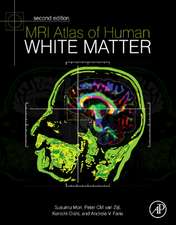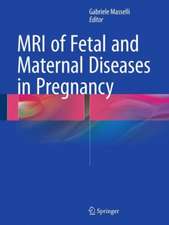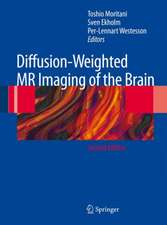Imaging in Nuclear Medicine
Editat de Augusto Giussani, Christoph Hoeschenen Limba Engleză Paperback – 12 apr 2015
| Toate formatele și edițiile | Preț | Express |
|---|---|---|
| Paperback (1) | 895.83 lei 6-8 săpt. | |
| Springer Berlin, Heidelberg – 12 apr 2015 | 895.83 lei 6-8 săpt. | |
| Hardback (1) | 723.42 lei 6-8 săpt. | |
| Springer Berlin, Heidelberg – 28 mar 2013 | 723.42 lei 6-8 săpt. |
Preț: 895.83 lei
Preț vechi: 942.97 lei
-5% Nou
Puncte Express: 1344
Preț estimativ în valută:
171.42€ • 178.62$ • 141.93£
171.42€ • 178.62$ • 141.93£
Carte tipărită la comandă
Livrare economică 03-17 aprilie
Preluare comenzi: 021 569.72.76
Specificații
ISBN-13: 9783642447464
ISBN-10: 3642447465
Pagini: 244
Ilustrații: VI, 237 p.
Dimensiuni: 155 x 235 x 13 mm
Greutate: 0.35 kg
Ediția:2013
Editura: Springer Berlin, Heidelberg
Colecția Springer
Locul publicării:Berlin, Heidelberg, Germany
ISBN-10: 3642447465
Pagini: 244
Ilustrații: VI, 237 p.
Dimensiuni: 155 x 235 x 13 mm
Greutate: 0.35 kg
Ediția:2013
Editura: Springer Berlin, Heidelberg
Colecția Springer
Locul publicării:Berlin, Heidelberg, Germany
Public țintă
Professional/practitionerCuprins
Imaging in nuclear medicine.- The role of imaging in nuclear medicine: the medical perspective.- Physics of imaging in nuclear medicine.- Tomographic and hybrid imaging in nuclear medicine.- Perspectives in nuclear medicine tomography: a physicist’s point of view.- Reconstruction algorithms and scanning geometries in tomographic imaging.- Advances in SPECT image reconstruction.- New approaches to quality assurance in medical imaging.- The EURATOM FP7 collaborative project MADEIRA.- Image magnification with an insert PET probe.
Recenzii
From the book reviews:
“The book is divided into four parts, each of which contains chapters focusing on generally related topics. … Imaging in Nuclear Medicine occupies a niche that would appeal to medical physicists developing an interest in the specialty as well as practicing nuclear medicine physicians who would like to better understand the basis of the most recent developments in image processing and reconstruction.” (R. Petter Tonseth, Radiology, Vol. 272 (1), July, 2014)
“This book concentrates on issues relevant to physics and imaging researchers, and does this well. … it brings together a number of important developments in a short volume, and it would be interesting for clinical scientists and others to refresh jaded palates with a reminder of where the field is heading, and particularly for those collaborating with academic researchers who need a short and fairly high-level introduction to nuclear medicine imaging.” (David Hall, Scope, Vol. 22 (4), December, 2013)
“The purpose is to provide an overview of recent and future trends that are, or are likely to be, important in the field of imaging in nuclear medicine. … The primary audience for this book is clinicians and scientists … involved in the development of nuclear imaging. There is something for everyone. … it represents a fair snapshot of where we are in nuclear medicine imaging, the nature of the problems that consume research and development efforts, and some insightful predictions about future innovations.” (Matthew R. Palmer, Doody’s Book Reviews, August, 2013)
“The book is divided into four parts, each of which contains chapters focusing on generally related topics. … Imaging in Nuclear Medicine occupies a niche that would appeal to medical physicists developing an interest in the specialty as well as practicing nuclear medicine physicians who would like to better understand the basis of the most recent developments in image processing and reconstruction.” (R. Petter Tonseth, Radiology, Vol. 272 (1), July, 2014)
“This book concentrates on issues relevant to physics and imaging researchers, and does this well. … it brings together a number of important developments in a short volume, and it would be interesting for clinical scientists and others to refresh jaded palates with a reminder of where the field is heading, and particularly for those collaborating with academic researchers who need a short and fairly high-level introduction to nuclear medicine imaging.” (David Hall, Scope, Vol. 22 (4), December, 2013)
“The purpose is to provide an overview of recent and future trends that are, or are likely to be, important in the field of imaging in nuclear medicine. … The primary audience for this book is clinicians and scientists … involved in the development of nuclear imaging. There is something for everyone. … it represents a fair snapshot of where we are in nuclear medicine imaging, the nature of the problems that consume research and development efforts, and some insightful predictions about future innovations.” (Matthew R. Palmer, Doody’s Book Reviews, August, 2013)
Textul de pe ultima copertă
This volume addresses a wide range of issues in the field of nuclear medicine imaging, with an emphasis on the latest research findings. Initial chapters set the scene by considering the role of imaging in nuclear medicine from the medical perspective and discussing the implications of novel agents and applications for imaging. The physics at the basis of the most modern imaging systems is described, and the reader is introduced to the latest advances in image reconstruction and noise correction. Various novel concepts are then discussed, including those developed within the framework of the EURATOM FP7 MADEIRA research project on the optimization of imaging procedures in order to permit a reduction in the radiation dose to healthy tissues. Advances in quality control and quality assurance are covered, and the book concludes by listing rules of thumb for imaging that will be of use to both beginners and experienced researchers.
Caracteristici
Presents the most recent developments in nuclear medicine imaging, with emphasis on the latest research findings Considers the latest advances in imaging systems, image reconstruction, noise correction, and quality assurance Discusses novel concepts, including those developed within the framework of the EURATOM FP7 MADEIRA project Lists rules of thumb for imaging of use to both beginners and experienced researchers Includes supplementary material: sn.pub/extras








